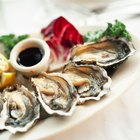
Caviar refers to the salted roe or egg masses of a female fish. Although most commonly associated with sturgeon, the roe may also come from salmon, whitefish, lumpfish or even trout. Considered a luxury, not to mention one of the most expensive food items in the world, caviar is most often sold as a garnish or spread. Because caviar is an extremely perishable food product, proper storage is essential to prevent foodborne illnesses associated with bacterial spoilage.
Unopened Containers
Commercial fresh caviar in tin containers or glass jars has a limited shelf life. Ideal temperatures for storing caviar in unopened containers is between 25 and 29 degrees Fahrenheit. Under these conditions, the vacuum-sealed jars of roe remain safe to eat for as long as six weeks. In an unopened tin, the caviar lasts about two weeks. Store the unopened caviar containers in the bottom drawer of your refrigerator, covered with a plastic storage bag full of ice. Replace the ice as it melts to ensure that the caviar is kept as cold as possible.
Opened Containers
Once a jar or tin of fresh caviar is opened, air enters and create the perfect environment for dangerous bacteria to grow and multiply. If you are serving caviar, keep in mind that perishable foods keep for only two hours unrefrigerated, and one hour if the temperatures in the serving area are 90 F or above, before they need to be discarded. Refrigerated within this time frame, caviar keeps for two to three days, provided the container is resealed and stored in the bottom drawer of the refrigerator, under a bag of ice.
Pasteurized Product
Pasteurized caviar has a longer shelf life than fresh caviar. The pasteurization process partially cooks the caviar, killing dangerous bacteria before the roe is stored in a vacuum-sealed container. Once the caviar is packed, an unopened container lasts for as long as 15 months. Once opened, the same rules as unpasteurized roe apply -- seal the container and place it in the refrigerator's bottom drawer, under an ice pack. If not eaten within seven days, discard refrigerated, pasteurized caviar.
Freezing
Because of the delicate nature of sturgeon caviar, freezing it is not an option. Storing caviar at zero degrees F or below does not affect the taste of the caviar, but the process of freezing -- followed by thawing when it comes time to serve the caviar -- negatively affects the quality and texture of the roe. Fresh roe pops when you bite down. Once the roe undergoes freezing, the texture becomes mushy and the caviar loses its signature pop.
Related Articles

How Long Can You Keep Cooked Chicken ...

How to Tell When Tortellini Is Bad

How to Preserve Nectarines

How Long Can Fresh Salsa Be Left Out?

How Long Can I Keep Food Safe in a ...

How to Defrost Frozen Mozzarella

Can Scalloped Oysters Be Prepared Ahead?

How Long Can You Keep Beer Refrigerated?

How Long Do Shucked Oysters Stay Fresh?

How Long Can Tuna Stay Fresh?

Does a Sliced American Cheese Product ...

Does Brandy Freeze?
Can You Freeze Capers?

How to Bake Frozen Spanakopita

How Long After Catching Should You Cook ...

Do You Need to Refrigerate Whipped ...

Can You Freeze Raw Oysters?

How Long Can a Bagel With Cream Cheese ...
Can You Thaw & Refreeze Clams?

Does a Chilled Champagne Bottle Need to ...
References
Writer Bio
Jonae Fredericks started writing in 2007. She also has a background as a licensed cosmetologist and certified skin-care specialist. Jonae Fredericks is a certified paraeducator, presently working in the public education system.
Photo Credits
Jupiterimages/Goodshoot/Getty Images